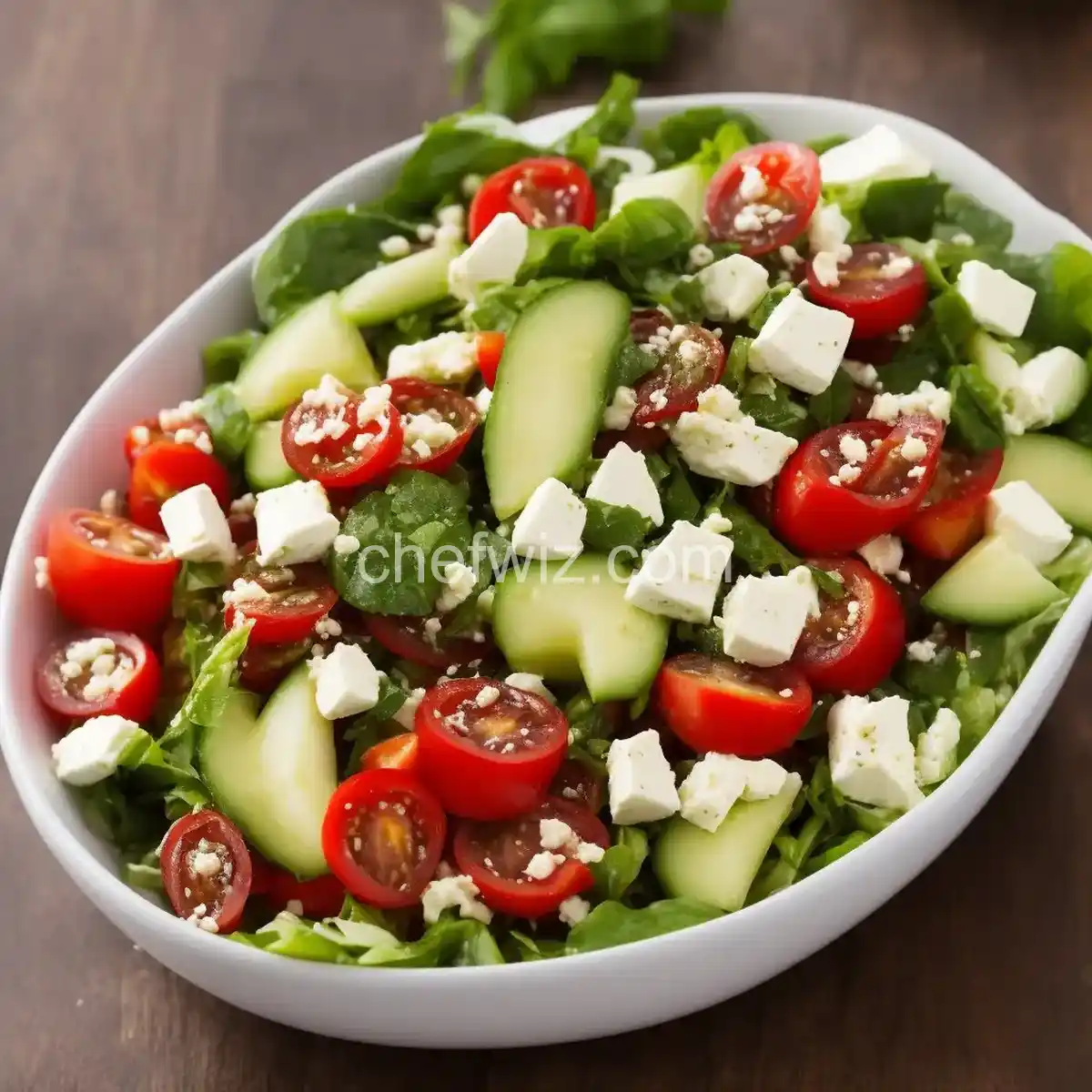Greek Salad
When it comes to refreshing and healthy salads, few can rival the vibrant flavors and wholesome ingredients found in a Greek salad. This iconic dish is not only a staple of Mediterranean cuisine but also a favorite among health-conscious food enthusiasts worldwide. So, what makes a Greek salad so special? Let’s explore the tantalizing combination of flavors, the nutritional benefits, and the versatility of this delightful dish.
A Symphony of Flavors
Imagine a plate filled with crisp and refreshing cucumbers, juicy tomatoes, briny olives, and tangy feta cheese. Tossed together with a generous drizzle of extra virgin olive oil, a squeeze of fresh lemon juice, and a sprinkle of aromatic herbs like oregano, this medley of ingredients creates a harmonious blend of flavors that dance on your taste buds.
Each bite of a Greek salad is like a mini adventure, taking you on a journey through the sun-kissed landscapes of Greece. The combination of ingredients represents the essence of Mediterranean cuisine, capturing the essence of the region’s rich culinary heritage.
A Nutritional Powerhouse
Not only is a Greek salad a delight for the taste buds, but it also packs a powerful nutritional punch. The abundance of fresh vegetables provides a wide array of vitamins, minerals, and antioxidants that support overall health and well-being.
Tomatoes, for example, are rich in lycopene, a potent antioxidant that may help reduce the risk of chronic diseases such as heart disease and certain types of cancer. Cucumbers, on the other hand, are hydrating and low in calories, making them an excellent choice for weight management.
Olives and olive oil, a staple in Greek cuisine, are a fantastic source of heart-healthy monounsaturated fats. These fats can help lower bad cholesterol levels and reduce the risk of heart disease. Additionally, the creamy feta cheese provides a good amount of protein and calcium, essential for maintaining strong bones and muscles.
Versatility at Its Best
One of the great things about Greek salad is its versatility. While the classic version includes cucumbers, tomatoes, olives, and feta cheese, you can customize it to suit your taste preferences or dietary needs. Add some red onions for a touch of sharpness or sprinkle some fresh herbs like dill or parsley for an extra burst of flavor.
Furthermore, a Greek salad can easily be turned into a complete meal by adding protein-rich ingredients such as grilled chicken, shrimp, or chickpeas. The combination of fresh vegetables and lean protein makes for a satisfying and nourishing dish that can be enjoyed as a light lunch or a hearty dinner.
Whether you’re a vegetarian, a pescatarian, or a meat lover, the versatility of a Greek salad ensures that there’s a variation to suit every palate and dietary preference.
Conclusion
In conclusion, a Greek salad is more than just a dish; it’s a culinary experience that combines a symphony of flavors, nutritional benefits, and versatility. Its vibrant colors, fresh ingredients, and tangy dressing make it a perfect choice for those seeking a healthy and satisfying meal.
Frequently Asked Questions
1. Can I substitute feta cheese with another type of cheese?
While feta cheese is traditional in a Greek salad, you can certainly substitute it with other crumbled cheeses like goat cheese or even shredded mozzarella.
2. Are Kalamata olives the only type of olives I can use?
No, Kalamata olives are commonly used in Greek salads, but you can use any type of olives that you prefer or have on hand.
3. Can I make a Greek salad in advance?
Absolutely! In fact, Greek salad tastes even better when the flavors have had time to meld together. Just make sure to store it in the refrigerator and add the dressing right before serving to keep the vegetables crisp.
4. Is a Greek salad suitable for a vegan diet?
Yes, a Greek salad can easily be made vegan by omitting the feta cheese. You can also substitute it with a vegan cheese alternative or simply enjoy the salad without cheese.
5. Can I add some grains like quinoa or bulgur to my Greek salad?
Yes, adding grains can add more substance to your Greek salad and make it even more filling. Cooked quinoa, bulgur, or even couscous can be wonderful additions.
6. Can I use bottled salad dressing instead of making my own?
While homemade dressing is always a great option, you can definitely use a store-bought Greek or Mediterranean-style dressing to save time and effort.
7. Can I serve a Greek salad as an appetizer?
Absolutely! A small portion of Greek salad can be a delightful and refreshing appetizer, setting the stage for the main course.
8. What are some other toppings I can add to my Greek salad?
Feel free to get creative with your Greek salad toppings. Some popular additions include roasted red peppers, artichoke hearts, or even grilled vegetables.

Greek Salad
Ingredients
- ¼ cup of extra-virgin olive oil
- 3 tablespoons of red wine vinegar
- 1 garlic clove (optional)
- ½ teaspoon of dried oregano
- ¼ teaspoon of Dijon mustard
- ¼ teaspoon of sea salt
- Freshly ground black pepper , to taste
- 1 English cucumber
- 1 green bell pepper
- 2 cups of halved cherry tomatoes
- 5 ounces of feta cheese
- ⅓ cup of thinly sliced red onion
- ⅓ cup of pitted Kalamata olives
- ⅓ cup of fresh mint leaves
Instructions
- Prepare the dressing by combining olive oil, vinegar, garlic, oregano, mustard, salt, and pepper in a small bowl. Whisk the ingredients together.
- Place the cucumber, green pepper, cherry tomatoes, feta cheese, red onions, and olives on a large platter.
- Drizzle the dressing over the ingredients on the platter and toss gently.
- Sprinkle a few pinches of oregano over the salad and garnish with mint leaves.
- Season to taste and serve.


















